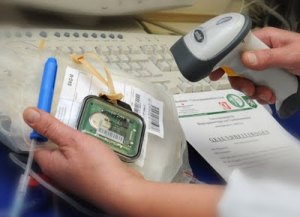Jul 28 2010
Donating blood can save lives provided the blood is secured without contamination, while being transferred from the donor to the recipient.
Sometimes, the quality of blood degenerates or worsens because of insufficient cooling. These processes are very difficult to confirm before the blood transfusion transpires.
 Donating blood can save lives provided the blood is secured without contamination, while being transferred from the donor to the recipient.
Donating blood can save lives provided the blood is secured without contamination, while being transferred from the donor to the recipient.
To avoid these things happening, Siemens along with the University of Graz, Austria, have formed a consortium, and created an RFID system fitted with temperature sensors. To help preserve the blood properly, the radio labels include the information about the blood, and regulate the complete cooling series by using temperature sensors or chips.
The sensor remains in the same position throughout the transportation system, including the centrifuge. The electronic system consists of a temperature sensor, a chip and a battery. This system is strong enough to endure centrifugal processes at 5000 times the acceleration of gravity. Immediately, before the transfusion, a reader verifies the data recorded on the chip for accuracy.
This is the first system ever to document a complete series right from the donor to the last link, the recipient.
Source: http://www.siemens.com